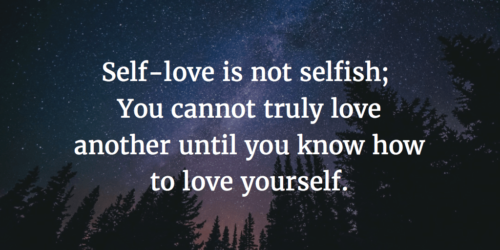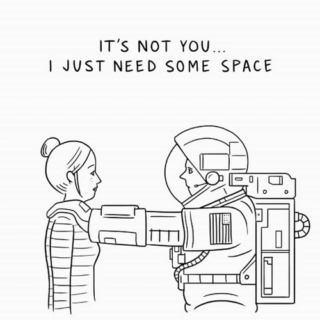
As a culture, we thrive on the fantasy of meeting our better half. When we do find someone, we tend to lose ourselves in it if we’re not mindful. Maintaining your individuality in relationships is beneficial for both your personal growth and your partnerships. Learn how four ways to achieve this balance. (Estimated reading time: 5-6 minutes)
“Individuality is very important for a full human life.”
— Dalai Lama
“You complete me.”
Who doesn’t love this seminal line from Tom Cruise’s character in the movie Jerry McGuire?
It melts the heart of any romantic and makes them long for a love like that. A union with their ‘missing piece’ – someone who makes them feel whole and complete.
As a culture, we thrive on the fantasy of meeting our better half. Whether that be through novels, songs, or Hollywood movies with fairytale endings, we find ourselves immersed in a culture that celebrates the merging of two people. The allure of blissful coupledom makes us take risks, and we’re more willing to make sacrifices if needed.
However, this glamorous portrayal of true love gives us false expectations. While making certain compromises is necessary to make any partnership work, losing ourselves in the process isn’t. Escalating divorce rates of over 50% and infidelity rates of over 40% is a clear sign that we’re missing an essential piece of the relationship game.

That missing piece is us. When we begin a new relationship, there is a strong tendency to forget the commitment that we have to our own development and journey.
We get so hung up on pleasing the one person who we expect can fill our voids and right our wrongs, without realizing that it’s our responsibility, and no one else’s. A partner will, in fact, magnify what we have neglected. They are meant to be our mirror, not a healer or therapist.
Having lost myself in a previous relationship, I speak from personal experience. To fit into my partner’s world, I chose to give up some fundamental parts of myself. By the end of it, I grew resentful and bitter because I knew, deep down, that I was betraying who I really was.
This experience taught me that two halves on an individual do not constitute a whole. It takes two ‘whole’ people who are willing to work on themselves to create and sustain the new entity of their relationship. Two people in a relationship shouldn’t have to complete each other – they need to complement one another.

Our fears, hurts, and insecurities make it hard for us to understand this distinction. The illusion of finding a partner who can rescue us, ironically, attracts us to those who trigger dysfunctional attachments and cause us to repeat old childhood patterns that have not been resolved.
Becoming aware of these tendencies is pivotal before we get into a serious connection if we are to avoid losing ourselves. There are plenty of people out there who will take advantage of your lack of self-knowledge and push their agenda on you.
Individuality is an integral part of your DNA and your character. Self-love and real confidence come from knowing yourself and following your desires. The freedom to develop our individuality and to live in accordance with it is one of the essentials of well-being.
We all begin life with our own soul plan, and a unique destiny and purpose. The people that we choose to play a key role in our lives should support us in our mission instead of distracting us from it.

Staying in alignment with your truth and soul mission enables you to become an active contributor to society. You’ll have the freedom to express your creative thoughts, entrepreneurial ideas, and innovations. You have the time and space to demonstrate what’s authentically you.
Here are four keys steps to maintaining your individuality in relationships:
1. Develop self-knowledge: ‘Know thyself’. There is undoubtedly some profound truth in Socrates words. Self-knowledge is the foundation for healthy self-esteem because, without it, it won’t be easy to find your way. There are many options and paths to choose, and the only way to decipher what’s right for us is by knowing what’s important – our passions, interests, values, and purpose.
When armed with this information, you can provide a clear picture to your partner about your preferences and your needs in order to be happy in the relationship. Not only will your partner respect you for this but it will reduce the chance of misunderstandings. It will also inspire your partner to broaden their scope of thinking and promote feelings of independence.
2. Prioritize time and space to ‘do you’: Many couples fall into the trap of doing everything together to the point that they become inseparable. While their co-dependence may seem endearing to some, it can ultimately be detrimental to the health of their relationship. They get so wrapped up in keeping each other happy that they forget to take care of themselves. Before anyone became a ‘we’, they were a ‘me’, and that part of them needs to be honored.
Allocate non-negotiable time to soak in our ‘me-ness’ – time that we can spend alone, with our friends, or our family, and engaging in activities and projects that we find meaningful and enjoyable. If you live with your significant other and if space permits, try creating your own sanctuary and fill it with things that are personally significant to you.
3. Speak up for yourself and lay healthy boundaries: Whenever you’re embroiled in conflicts, disagreements, and negotiations, it’s essential to make your voice heard and speak up for yourself. Having opinions and preferences of your own, if conveyed to others respectfully, does not make you selfish or aggressive. Unlike what many of us are made to believe (women especially) assertiveness and having standards is not a weakness – it is your right and a sure-fire way of earning the respect of others and getting what you need to thrive.
Transparent communication and laying healthy boundaries protects you from being overwhelmed by the unreasonable demands of others, particularly the dominating kind. You have to intuitively figure out when it’s necessary to draw a line in the sand in your partnership.
4. Be considerate of their needs: We want to be wary of going overboard in our efforts to maintain individuality in our relationships. We don’t want to go in the opposite direction and become a demanding tyrant who stomps all over their partner. It’s all about striking a balance between showing ourselves the love we need while also demonstrating our concern for what our partners need to feel loved in the relationship.
There has to be a good flow of reciprocity in order to maintain balance. Strive for good communication with your partner and ensure that you schedule quality time together. You’ll find that if you’ve spent enough time on yourself and your interests, your time with your partner will be more enjoyable and the intimacy and connection will deepen.
Ultimately, relationships provide an opportunity for two individuals to come together and offer love, support, appreciation, and care for each other. Yet, this bounty is only be accessible to those who can offer the same things to themselves first.
All my best on your journey,
Seline

Reflection Question: Do you find maintaining your individuality in relationships a challenge? What are the main issues that you face and what are some initial steps that you can take to overcome them?
Did you like this post? Sign up below and I’ll send you more awesome posts like this every week.

Interesting thoughts! I was always taught that a healthy relationship is one where the weaknesses of one partner are bolstered by the strengths of the other. When one is struggling the other is strong and then the roles are reversed and both share and help and support each other.
A good relationship is not giving up yourself in order to be what your partner wants or needs, it is finding a partner who helps you be what you are destined to be!